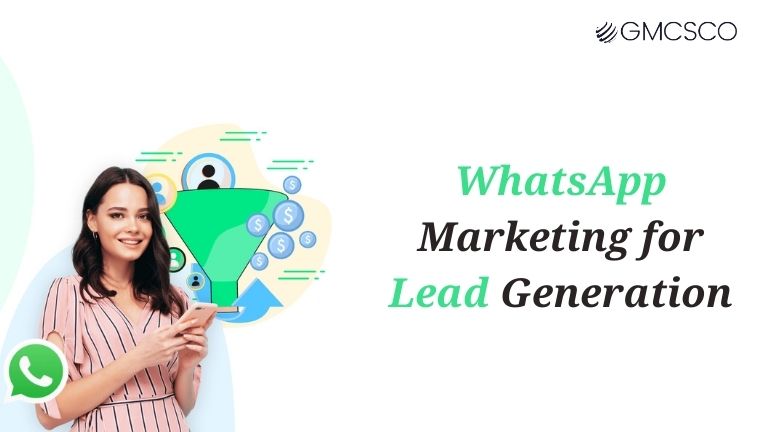
WhatsApp has proven to be an effective tool for lead generation in digital marketing. With its broad user base and high engagement rates, businesses can utilize WhatsApp to connect with potential clients, nurture leads, and ultimately convert them into loyal customers. Here’s a guide to using WhatsApp for lead generation, capturing leads, automating follow-up messages, and engaging qualified leads.
Using WhatsApp as a Lead Generation Tool
Generating leads on WhatsApp requires strategic planning. Here’s how to do it:
- Create an Official WhatsApp Business Account: The first step in using WhatsApp for lead generation is setting up a WhatsApp Business account. A professional business profile enhances credibility, displaying key details like your business name, contact info, description, and hours of operation, making it easier for leads to reach out.
- Promote Your WhatsApp Number: Give potential leads an easy way to contact you through WhatsApp:
- Website: Add a WhatsApp button to your site for instant messaging access.
- Social Media: Share your WhatsApp contact on social profiles, with engaging content that encourages followers to reach out.
- Email Campaigns: Include WhatsApp contact info in newsletters, inviting subscribers to connect directly.
- Offer Valuable Content: Attract leads with valuable content that resonates with them:
- Ebooks and Guides: Share industry insights and exchange them for contact info.
- Webinars: Offer free webinars, requiring WhatsApp registration for access to generate leads and establish expertise.
- Exclusive Offers: Run WhatsApp-only discounts to incentivize leads to engage with your brand.
Lead Capture Forms and Automated Follow-Up Messages
Once leads are drawn in, the next step is to capture their information and maintain communication.
- Create Lead Capture Forms: Lead capture forms help gather potential customer details. Use tools like Google Forms, Typeform, or website forms to create effective lead forms:
- Less is More: Keep fields limited to essentials like name, phone, email, and relevant interests.
- Strong Call to Action (CTA): Use clear CTAs like “Download Free Guide” or “Subscribe for Offers” to prompt action.
- Redirect to WhatsApp: Set form submissions to direct users to WhatsApp chat for instant follow-up.
- Automate Follow-Up Messages: Automation is essential for lead engagement:
- WhatsApp Business Features: Set up automated greetings and away messages to confirm receipt and manage expectations.
- Third-Party Automation Tools: Use platforms like Twilio or Chatfuel to integrate automation with WhatsApp, enabling follow-up messages based on interactions.
- Personalized Responses: While automated, personalize messages by addressing leads by name and referencing their inquiries for a more engaging experience.
WhatsApp is great for nurturing leads—here’s how to close deals on WhatsApp. Lead nurturing is the key to turning leads into customers. Here are some effective strategies:
- Segment Your Leads: Not all leads are created equal; segmenting them by interests, demographics, or buying stage can enhance your marketing. Use WhatsApp to categorize and tailor messages accordingly:
- New Leads: Send welcome messages highlighting products or services.
- Warm Leads: Engage those who showed interest but didn’t convert with relevant content or reminders about products they viewed.
- Hot Leads: Target those ready to buy by offering special deals to help close the sale.
- Provide Timely Responses: Responsiveness is critical in lead generation. Make sure you or your team responds quickly. Once WhatsApp’s business tools are integrated, manage response times wisely to set clear expectations, boosting the chances of conversion.
- Share Engaging Content: Use WhatsApp to send engaging content, such as:
- Product Demos: Provide short video clips to showcase products or services in action.
- Testimonials and Case Studies: Share success stories to build trust and credibility, persuading interested leads.
- Exclusive Updates: Offer leads sneak peeks of new products or services, making them feel valued and more likely to interact with your brand.
- Bulk WhatsApp Marketing Services: For larger lead lists, consider using bulk WhatsApp marketing to reach many leads at once:
- Promotional Messages: Inform leads about special offers.
- Event Invitations: Send invites for webinars or product launches. Bulk messaging saves time and keeps communication consistent.
- Track Engagement and Adjust Strategies: Monitoring your WhatsApp marketing efforts allows for continuous improvement. Track engagement, click-through, and conversion rates. Adjust your strategy based on what gets the best response to maximize impact.
- Create a Sense of Urgency: Use urgency tactics to prompt leads to act, like limited-time discounts or bonuses. Send WhatsApp reminders about these deadlines to encourage swift action.
- Offer a Personalized Experience: Personalize messages using details from lead capture forms. Address leads by name, reference their interests, and make recommendations based on their activity with your brand for greater engagement.
- Follow Up After Conversion: Don’t end the conversation after a lead converts. Use WhatsApp to thank new customers and gather feedback, building lasting relationships and opening doors for future sales or referrals.
Conclusion
WhatsApp marketing for lead generation provides an ideal opportunity to connect with potential customers in a personalized, efficient way. With WhatsApp’s features like lead capture forms and automated follow-ups, businesses can nurture and convert leads into loyal customers.
For maximum effectiveness, focus on value, responsiveness, and use of automation tools. Implementing strategies like lead segmentation, engaging content, and urgency can further enhance sales. As the digital landscape evolves, integrating WhatsApp into your strategy becomes essential for meaningful audience engagement and results.
